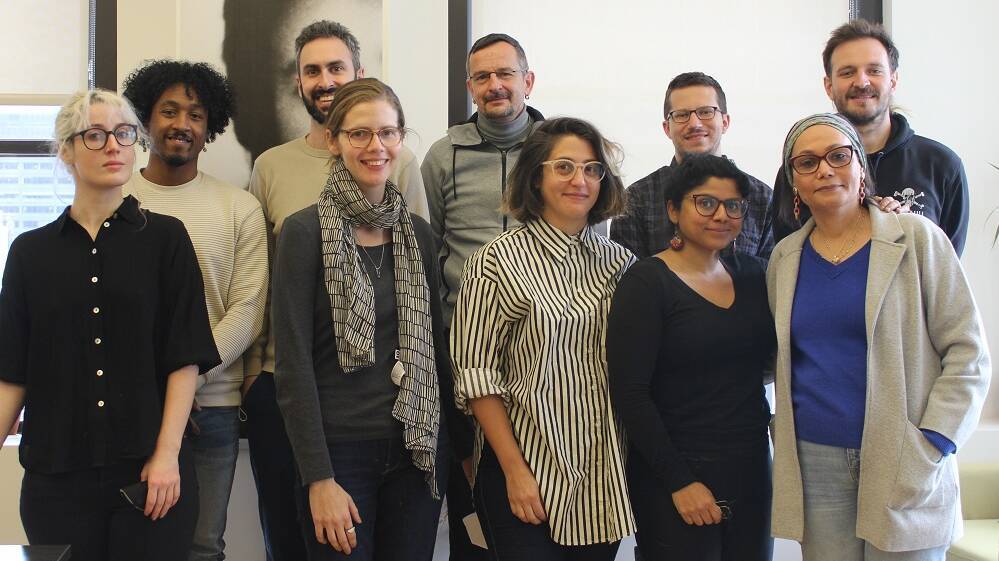US and Canada Regional Office
Our regional office in New York City coordinates the Rosa Luxemburg Foundation’s work in the United States and Canada
(Kopie 1)
Among the global institutions providing a framework for the negotiation of issues that will decide our future, the United Nations can claim to have the greatest legitimacy. The list of human rights challenges is long and includes social inequality, poverty and hunger, migration, climate change, minority rights, and violent conflicts. They are all linked in complex ways. Another pertinent issue is emerging nations, such as the BRICS countries, who are shifting the global balance of power.
A global architecture must be put in place — even if the legion of problems and conflicts that exist alongside the fundamental inequalities make clear the constraints that the UN faces in guaranteeing peace and equality for all. Its agenda for 2030, with its Sustainable Development Goals (SDGs) and the Paris Climate Agreement, are two major schemes that the UN is pursuing in the attempt to live up to its role as a global political authority. They too, however, mirror existing power relations and structural inequalities.
At the same time, transatlantic ties are an undisputed cornerstone of German (and European) foreign policy, but they are being called into question by the Trump administration’s increasing drift towards unilateralism. From a progressive perspective, this development raises a set of fundamental questions regarding the future of transatlantic relations: what can be done in order to improve understanding among, and deepen relations between, the Left in Germany, Europe, and North America? What can be done to counter the resurgence of nationalism, racism and far-right populism on both sides of the Atlantic? How can rising social inequality be stopped? Can the trend perhaps even be reversed? How can alternatives to far-right populist and neoliberal austerity policies be shaped and promoted?
Activities
- Global Governance
With its global focus, the New York regional office supports progressive actors (especially from the Global South) in questioning structural inequalities and pushing for a more just, democratic, and peaceful world at the UN level. Its work concentrates on shaping the main processes at the United Nations, such as those concerning disarmament, housing/rent, indigenous peoples’ rights, gender equality, corporate regulation, and safeguarding human rights — in short, on building a transregional network that incorporates all parts of the globe. This includes exchanging successful strategies, disseminating expert knowledge and publishing studies and educational materials. - Socio-Ecological Transformation
Social and the environmental questions can no longer be treated as isolated issues. We will only be able to effectively respond to global challenges if we conceive of them as part of a larger context in which they are also understood as existential challenges. Calls for “climate justice” are expressions of this new understanding.
Based on critical analyses of the socio-ecological status quo, the aim is to develop alternative models. One of the initiatives that our New York office helped launch as part of its efforts to support social movements is Trade Unions for Energy Democracy (TUED), a global, multi-sector association run by trade unionists that promotes solutions to climate change and energy poverty in the countries of the Global South by advancing public and democratic control over energy resources. - Progressive Transatlantic Dialogue
By sharing knowledge and left-wing perspectives on the US and Canada on one side of the Atlantic, and Germany and Europe on the other, the Rosa Luxemburg Foundation seeks to challenge the prejudices and stereotypes that continue to thrive in Germany and Europe, as well as in the US. The office provides critical analyses of US and Canadian society, including their respective economic, domestic, and foreign policies — and keeps an equally watchful eye on developments in German and European politics.
In this context, our work involves promoting alternative policies to austerity and strategies to stop societies from drifting to the right. Austerity has had massive impacts on both regions. These policies are being met with resistance, from Greece and Spain to Canada and the United States, but rarely witnesses the development of truly viable alternatives. In the meantime, right-wing populists claim to have all the solutions to the current crisis.
The Rosa Luxemburg Foundation seeks to contribute to a progressive North Atlantic discourse and has set itself the task of deepening our understanding of social developments unfolding on both sides of the Atlantic. But this is not our only aim. In conversation with actors embedded in trade unions, higher education institutions, social movements, and politics, we hope to develop political alternatives to neoliberalism and strategies against increasingly aggressive and authoritarian forms of nationalism. In this context, it is also important for the foundation to directly involve those actors particularly affected by rising inequality and discrimination.

New York City Regional Office
Director: Andreas Günther
The Rosa Luxemburg Stiftung New York Office
275 Madison Avenue, Suite 2114
New York, NY 10016
+1 (917) 558-2927